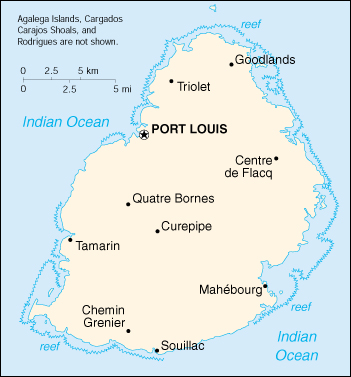Mauritius
 Mauritius is an island of volcanic origin estimated to have been formed some 70 million years ago. It is situated in the West of the Indian Ocean between latitudes 19°58' and 20°32' South and longitudes 57°17' and 59°46' East. Its land area of 1865 square kilometers also has jurisdiction over the islands of Rodrigues, Agalega and St. Brandon.
Mauritius is an island of volcanic origin estimated to have been formed some 70 million years ago. It is situated in the West of the Indian Ocean between latitudes 19°58' and 20°32' South and longitudes 57°17' and 59°46' East. Its land area of 1865 square kilometers also has jurisdiction over the islands of Rodrigues, Agalega and St. Brandon.
On account of the island's remoteness from large land masses and the influence of the Southeast Trade Winds which bring marine air throughout the year, the climate is sub tropical and warm and pleasant all year round. Cyclones occur during the summer months (October to March). They may be disruptive but an efficient weather system provides forecasts, information and advice. Mauritius Standard Time is GMT +4.
Formerly uninhabited, Mauritius was discovered in the early 16th century by the Portuguese who, however, made no serious attempt at settlement. In 1688, the Dutch occupied the island but abandoned it in 1710. The Dutch named Mauritius after the Dutch prince, Maurice Van Nassau. The French took possession of the island and called it Isle de France. They developed the island rapidly until 1810 when it was handed over to the British and officially became a British colony in 1815. It became an independent country within the Commonwealth in 1968.
The population of Mauritius stands at slightly above 1 million. The rate of growth of the population is estimated at 0.8 % per annum and population density is 616 persons per square kilometer. Notwithstanding its size, the country embraces a great diversity of people of Indian, African, Chinese and European origin. The result is a mosaic of racial groups, cultures and religions which co-exist in a peaceful and enviable harmony. Not surprisingly, the languages spoken are as varied as the people, while English is the official language, French is commonly used in everyday life. However, Creole is the lingua franca and is understood by one and all.
Mauritius is internationally recognized as one of the few open and stable democracies among the developing countries. The Republic of Mauritius has a presidential democracy. The President is the Head of the State and Commander in Chief. The Prime Minister acts as Head of Government, with full executive power.
Internal transport is entirely dominated by vehicle traffic. Cheap public transport is provided by bus and taxi services which operate in all areas. The focal point of sea transport is Port Louis harbor that is situated in the Northwest of the island. It is a modern and efficient port which provides a wide range of cargo handling and harbor facilities including the handling of containers, petroleum products, fertilizers, cement, edible oil, etc. Transhipment facilities with a free storage period of 14 calendar days are available. In 2006, over 5 million tons of cargo were handled through the port.
There are regular sailings of cargo vessels between Mauritius and the United Kingdom, Europe, Africa, the Far East, Australia, the U.S.A. and Canada. Air traffic operates from Sir Seewoosagur Ramgoolam international airport, which is situated in the Southeast of the island and is about an hour's drive from Port Louis. The continuing rapid growth of cargo and passenger traffic has necessitated the extension of the cargo terminal and the construction of a new terminal building.
The major airlines serving the island are Air Mauritius, Air France, British Airways, Lufthansa, Air India, Singapore Airline, Cathay Pacific, Zambia Airways, South African Airways, Emirates and Virgin Atlantic Airways.
The island is covered by a telephone network that is fully digitalized with computer controlled electronic exchanges. A network of optical fiber cable has been installed. The system provides International Direct Dialing (IDD) facilities to all subscribers and access to the Internet. Mauritius is able to provide international gateway facilities to many countries. Mauritius is not just a tourist paradise. A ride inside the country will show you a nationwide beehive of industries with thousands of skilled men and women busily engaged in a spectacular industrial revolution.
Several key factors have contributed to our industrial development. These are: political stability within a democratic framework on the Westminster model, excellent air and sea connections, sophisticated communication facilities plugged into the world network, an educated workforce, bilingual in English and French. Mauritius is now embarking on the second phase of its industrial program in order to diversify its economy.
Apart from the industrial revolution, Mauritius has established sector services such as a centre for offshore business and a free port authority. The centre for offshore activities is providing a variety of schemes that can use Mauritius as a base to be involved in investment around the world. The Free Port Authority is becoming a platform to serve the Indian Ocean regions and the African countries with goods not only from Mauritius but also from any part of the world.
The Merchant Shipping Act has recently been amended to make the registry most attractive. The salient features of the Register of Mauritius Ships are described in this directory.

